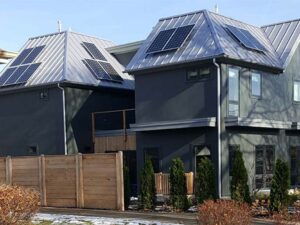Outfitting Your Home With Solar Panels
Many homeowners believe it is important to reduce their carbon footprint while at the same time finding ways to reduce their electric bills. Installing solar panels is a way to achieve both ends and in this article, we will discuss some tips for installing them in your home.

5 Tips for Outfitting Your Home With Solar Panels
Do the Research
Your home needs to have a southern exposure that is unimpeded by greenery, and it may be necessary to remove limbs or to cut down trees in order to remedy this situation. In addition, solar panels can cost a substantial amount of money, and you will need to secure financing from a bank ahead of time. There may be programs in your state that will help offset the outlay, and you may be able to avail yourself of rebates, tax credits, and other savings. Doing your homework here will be well worth the effort.
Make Preparations
Your roof will need to accommodate the solar panels, so, it is good to have them inspected by a professional before beginning. The roof will need to be able to bear the load required by the solar panels, and this will be especially difficult to do if there are already several layers of shingles in place. Your roof will also need to have at least ten years left on it, and if this is not the case, it is suggested that a new roof be installed before adding solar panels to the mix. This is because it will be very difficult to move the panels to replace the roof once they have been added.
Figure Out Your Electricity Consumption
In order to determine how many solar panels you need, you will need to know what your energy needs are. Figure out the average kWh that you use for all twelve months. This will ensure that your panels will be able to meet the demand during the months when your usage goes up. You will also need to watch the way the sun moves around your property, and decide whether to only put panels on your roof or whether you will also set them on the ground. You will need to have a reliable, steady source of sunlight to meet your energy needs.
Check Building Codes
If you live in a subdivision with a homeowners association, you will need to check the guidelines set for by your community’s covenant. Also, find out what the codes are in your area regarding solar panels, and get the appropriate permits. You will likely need to submit a copy of your plans to the department responsible, and you may need two separate permits, one for the building and one for the electrical work.
Find a Reputable Installer
You will benefit from the experience and knowledge base of a qualified solar panel installer, and it is important to choose a firm that has the proper certifications. You can also ask your installer for references from customers they have serviced in the past two to three years.
Kapital Electric, Inc. has experience serving the counties surrounding their location in Bensenville, IL, installing solar panels and providing superior work for their clients. Contact Kapital Electric, Inc. to begin your journey of solar panel installation today!
““
